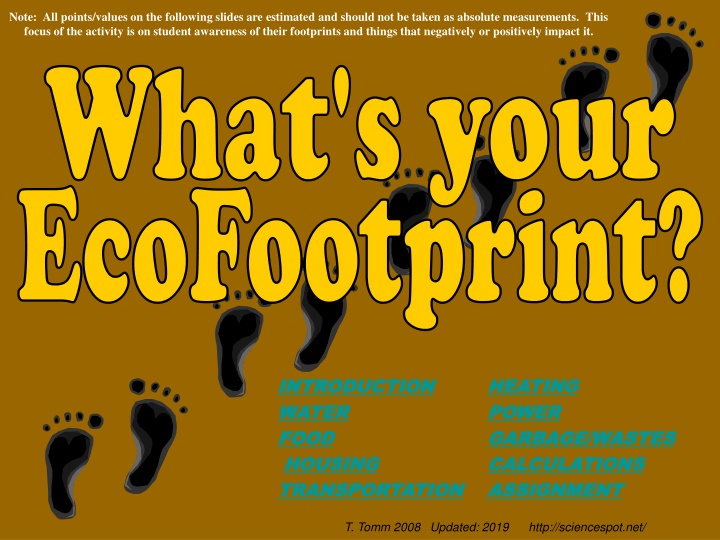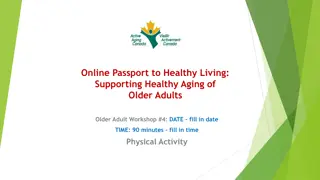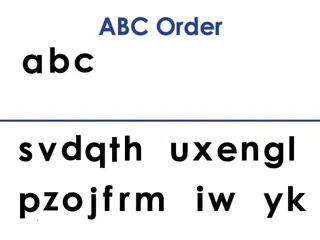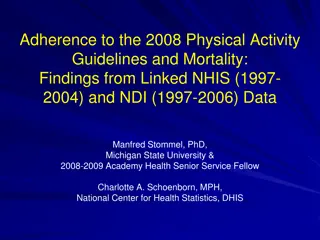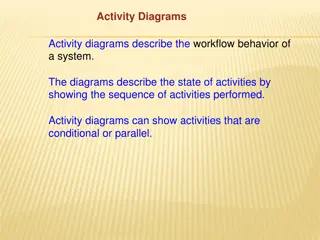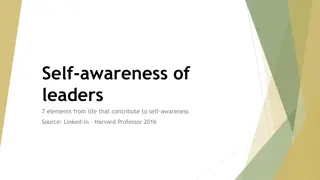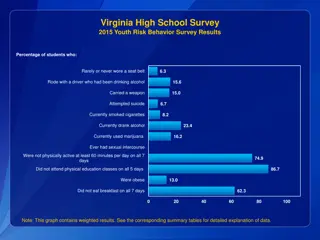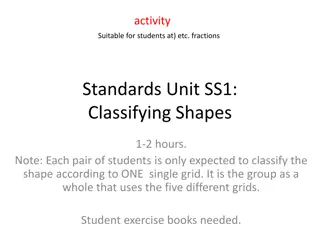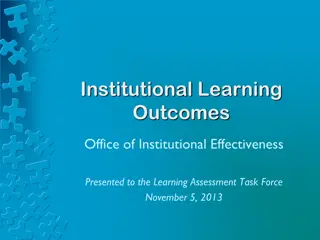EcoFootprint Awareness Activity for Students
Engage students in an EcoFootprint awareness activity to understand their impact on the environment through water, food, housing, transportation, and other aspects. By answering questions and calculating points, students can assess their ecological footprint and identify areas for improvement in their daily habits.
Download Presentation

Please find below an Image/Link to download the presentation.
The content on the website is provided AS IS for your information and personal use only. It may not be sold, licensed, or shared on other websites without obtaining consent from the author.If you encounter any issues during the download, it is possible that the publisher has removed the file from their server.
You are allowed to download the files provided on this website for personal or commercial use, subject to the condition that they are used lawfully. All files are the property of their respective owners.
The content on the website is provided AS IS for your information and personal use only. It may not be sold, licensed, or shared on other websites without obtaining consent from the author.
E N D
Presentation Transcript
Note: All points/values on the following slides are estimated and should not be taken as absolute measurements. This focus of the activity is on student awareness of their footprints and things that negatively or positively impact it. What's your EcoFootprint INTRODUCTION INTRODUCTION WATER WATER FOOD FOOD HOUSING HOUSING TRANSPORTATION TRANSPORTATION HEATING HEATING POWER POWER GARBAGE/WASTES GARBAGE/WASTES CALCULATIONS CALCULATIONS ASSIGNMENT ASSIGNMENT T. Tomm 2008 Updated: 2019 http://sciencespot.net/
What is a eco footprint? https://www.schooltube.com/media/t/1_octv5jyj
The questions on the following slides and your responses will be used to determine your impact on the Earth and its resources. If you are not sure of an answer, use your BEST GUESS! If you live in two different places, pick ONE to answer the questions.
WATER USAGE Start this SECTION WITH 50 POINTS since we all use water for cooking, drinking, cleaning, and other activities. Add or subtract points depending on your water usage. PICK ONE: Take a bath or shower ONLY once or twice a week -20 Take a bathevery day -5 Take a shower every day -10 if they are less than 5 minutes - 5 if they are more than 5 minutes SUBTRACT POINTS FOR EACH ONE THAT APPLIES: Does your family collect rainwater for gardening & other outdoor need? - 10 Do you leave the water running when you brush your teeth? No -10 Yes 0 PICK ONE: How many times do you wear your clothes before washing them? Always wear them more than once Most of the time -5 Never always wash them after wearing once -10 -0
FOODS Start this SECTION WITH 100 POINTS since we all need to eat. Add or subtract points depending on the questions below. PICK ONE Is your family: Mostly carnivores? -5 Mostly omnivores? -10 Mostly herbivores? -20 PICK ONE - Does your family: Buy only fresh foods (vegetables, bread, and meat)? -20 Buy a combination of fresh and processed food? -10 Buy mostly packaged foods or ready-to-cook foods? -5 SUBTRACT POINTS FOR ALL OF THESE THAT APPLY: Does your family have a garden? -10 Does your family can or freeze foods for use during the winter? -10 Does your family hunt local wildlife or fish? -10 Does your raise your own livestock (or buy from a local farmer)? -10 Add TWO POINTS for EVERY MEAL you have eaten at/from a fast food or other restaurant in the last week? ADD the # to your score.
HOUSING The amount of resources used to build and maintain the places where we live depends on the size of it and the number of people living with us. Start this section with 0 points and add points based on the following items: Add 2 points for each bedroom in your home (count the rooms with beds in them.) Add 2 points for each bathroom in your home (count the rooms with toilets AND a bath/shower.) How many pets do you have (inside and outdoor)? Add 2 points for each one. Notes: Add 4 points for a fish tank regardless of how many fish are in it. Livestock, such as pigs, cattle, chickens, goats, etc. do not count as pets.
TRANSPORTATION Start this 0 POINTS for this section and add points depending on the ways you and your family travel. PICK ONE - How did you get to school today? Rode in small car (or a school bus) +10 Rode in a medium/large car or van +15 Rode in a truck or SUV +25 Walked or rode a bicycle to school +0 ADD POINTS FOR ALL OF THESE THAT APPLY: How many times in the last week have you traveled more than an hour from home? +5 for each trip. How many passenger vehicles (car, truck, van, SUV) does your family own? +5 points for each. How many ATVs, motorbikes, boats, or other motorized vehicles does your family own? +5 points for each.
HEATING YOUR HOME In this section START WITH 50 POINTS since heating a house usually uses energy obtained by burning fossil fuels, which releases carbon dioxide into the atmosphere. To soak it up, trees will have to be planted, using up precious land. So, subtract points for each energy-saving thing you do. SUBTRACT POINTS FOR ALL OF THESE THAT APPLY: If your home is well insulated (no drafts) -10 If your home has new windows -5 If your family sets the thermostat low and everyone wears warm clothes -5 If your family only turns on the air conditioning when necessary -5 If your family uses a programmable thermostat -10
POWER (or ELECTRICITY) For most people, the electricity they use comes from burning fossil fuels which releases carbon dioxide. START THIS SECTION WITH 50 POINTS and subtract points for every electricity-saving thing you do. If you alwaysswitch off the lights if a room is no longer in use -10 If you always turn off these items rather than leaving them on: TVs -5 Computers -5 Game systems -5 If you always unplug chargers when they are not in use -5 If your family uses at least 5compact fluorescent or LED light bulbs in your home -5
GARBAGE/WASTE You can t help but create some waste, and what you throw away must be disposed of in landfill sites, using up valuable land as well as resources to transport it. START WITH A SCORE OF 50 POINTS and subtract points for everything you do to reduce waste. Does your family: Recycle all paper -5 Recycle all aluminum and other metal cans Recycle all empty plastic containers Recycle all empty glass containers -5 -5 -5 Does your family Use composting for all kitchen and garden waste Reduce wastes by buying less, mending and reusing old things, or buying second hand clothes -5 Donate items that you can no longer use or wear (charity or hand down to friend/family member) -5 -5
How many planets would be needed if everyone were to live like you? Let s find out! 1st Calculate your TOTAL POINTS. ADD THE POINTS from each section. MULTIPLY by TWO since there are a lot of other things we use & do we that use Earth s resources that were not added in. 3rd - Divide the number by 100 to determine the number of hectares your lifestyle impacts. 4th Use the chart to determine the # of planets you would need. 100 Hectares 1.99 or less 2.00 4.00 4.01 6.00 6.01 - 8.00 More than 8.01 # of Planets 1 2 3 4 5 or more
What does it mean? 1 planet If everyone lived like this, we would only need one planet! Human existence would be both sustainable and fair as there is enough land on the Earth to support the whole population at this level of land use. At present, about two-thirds of the global population has an ecological footprint of less than 2 hectares each. If everyone on the planet lived like you, then we would need two planets to provide 2 planets enough land to support us because you are using up twice your share of the Earth if it were divided up equally amongst the whole population. If everyone on the planet lived like you, we d need three planets to provide enough 3 planets land to support us because you are using up three times your share of the Earth if it were divided up equally amongst the whole population. 4 planets If everyone lived like you, we d need four planets to support us because you are using up four times your share of the Earth if it were divided up equally amongst the whole population. 5 or more planets If everyone lived like you, we d need five or more planets to support us because you are using up five or more times your share of the Earth if it were divided up equally amongst the whole population. How many planets do we have to use?
What actions could we take EVERY DAY to make our ECOFOOTPRINT smaller? Use online resources to help you identify things you can do to reduce your footprint. Decorate your footprint by listing at least 5 things you will do to reduce your footprint. Add pictures for EACH one. Due FRIDAY! You will have time after the quiz tomorrow to work on the assignment. Done? Write your name in the big toe and turn into the bins by the phone caddy. Work on LEGENDS, study QUIZLET, review your notes, or work on homework or interventions for other classes!
